A.I.C. : the Braude Memorial Collection
Dorothy Edinburg collected drawings (18th - 20th C.) -- and this exhibit celebrates their donation to the museum -- as well as a certain approach to collecting that was spelled out in a monumental text that covers the first wall of this exhibition.
Rather than just picking what she liked to see, she chose drawings that would:
* effectively present the essence of an artist's achievement
* relate to objects in other media but also function as significant independant statements
* play a seminal role within an artist's ouvre
* satisfy high standards of authenticity and condition.
Here's the ones I liked the most:
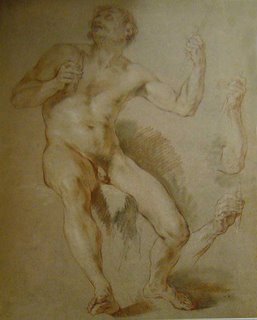
This is what, for me, European figure drawing is all about: the crisp articulation of of volumes in space -- that just feels endlessly refreshing. The artist is Francois Lemoyne (1688-1737)-- and the subject is Hercules -- forced by a petulant queen to do woman's work (in the buff, no less !) Does this really feel like a Hercules ? I don't think so -- but there's so much rational optimism and vigor there -- I'm ready to believe that the whole mythological set-up is just a showpiece for good figure drawing (as Baroque opera might be called a showpiece for good voices)
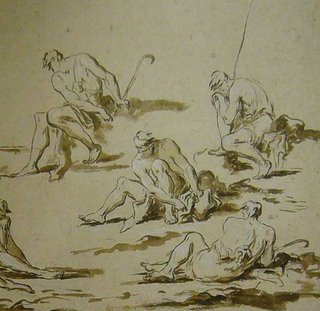
Alessandro Magnasco (1667 - 1749) was a great cartoonist who was, perhaps, a little ahead of his time -- i.e. he had to place his whimsical, electric sketches into historical or religious paintings -- often leaving others to paint the landscape or architecture. Leaving the great symphonic compositions to a contemporary like Tiepolo, he was master of detail. (this exhibit had a Tiepolo -- but it was a disappointment -- compared to many others that I've seen)
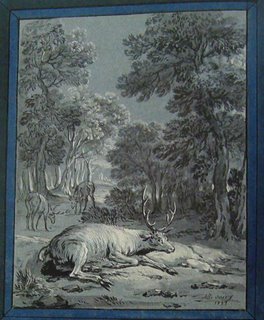
Jean Baptiste Oudry (1686-1735) "Sick Stag": The previous drawings seemed to be preparatory sketches for paintings -- but this one, like many others in the show, seems to have been done as a decorative item iself -- drawing on paper just as others might paint on ceramic plates. Usually this kind of work bores me -- even if it is evidentaly well made. But this one has such an atmosphere of sweet melancholy -- and I love to feel sad. (and Oudry is one of my favorite animal-painters)
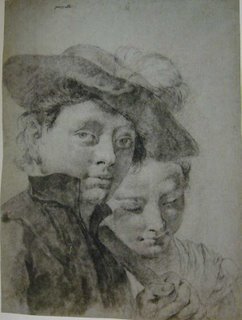
Over the years, I've collected books of "Master Drawings" and Piazetta is one of the usual suspects. I've always enjoyed the fullness of his volume -- but was never happpy with how it all fit together. The notes that accompanied this drawing may have explained why: Piazetta sold these sketches to tourists, not to churches or courtiers -- so sentimentality was more valued than profundity.
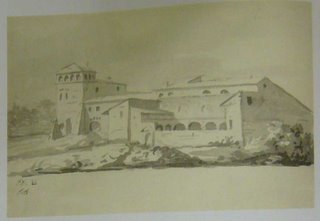
This little Italian landscape by Jacques Louis David (1748 - 1825) actually gave me more enjoyment than anything else in the show. He did it in 1775 -- soon after winning the Prix de Rome and and a trip to Italy. It's all that thrill of Classical culture -- its stateliness -- it sunniness - and more than any other, this drawing takes me to a place I want to be.

Prudhon (1758-1823) is the hero of French drawing because he turned the standard academic exercise into an objet d'art - with a charming classical atmosphere. This drawing is nice -- but as it recalls the drawing of the previous century (Lemoyne) or the classical sculpture of the next (Maillol) -- I feel its shortcomings. Did he successfully negotiate that delicate space between the model's right arm and her torso ? I just don't think so.
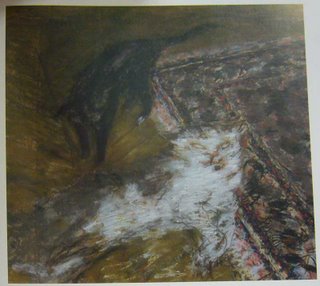
Maybe you have to love cats to enjoy this pastel -- but it just seems to present the essence of the feline mischief with which I am all too familiar. If a choice must be made between thorough and lively --- I'll always pick lively.
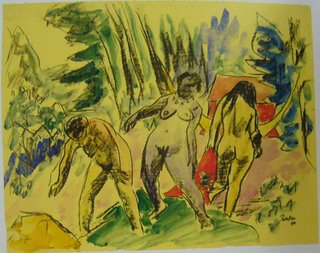
One of the things that irritates me the most about this kind of exhibit is the servile compliance with the canon: the endless repetition of the same famous artists -- as if there weren't tens-of-thousands of good, interesting drawings made by names unknown. But then the collector would have to rely on taste -- and that's not how this -- or many other collections --were made.
But the above artist, Hermann Max Pechstein (1881-1955) is pretty far from the A-list -- and I really enjoyed the hippie atmosphere of the above scene: zoftic art chicks cavorting nude in the campground beside his big red tent. Looks like fun to me !
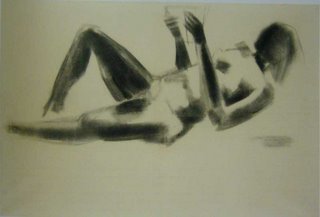
The most recent piece that I enjoyed was this lifesize charcoal drawing by Nicholas De Stael done in 1953. American abstract painting interests me about as much as lawn bowling -- but I like the story -- and the results -- of this abstract painter's love affair with a tall young woman -- whose beautiful body brought him back to the world of figurative art.
No erudite theory is required to enjoy drawing -- and looking at -- the beloved.
Rather than just picking what she liked to see, she chose drawings that would:
* effectively present the essence of an artist's achievement
* relate to objects in other media but also function as significant independant statements
* play a seminal role within an artist's ouvre
* satisfy high standards of authenticity and condition.
Here's the ones I liked the most:

This is what, for me, European figure drawing is all about: the crisp articulation of of volumes in space -- that just feels endlessly refreshing. The artist is Francois Lemoyne (1688-1737)-- and the subject is Hercules -- forced by a petulant queen to do woman's work (in the buff, no less !) Does this really feel like a Hercules ? I don't think so -- but there's so much rational optimism and vigor there -- I'm ready to believe that the whole mythological set-up is just a showpiece for good figure drawing (as Baroque opera might be called a showpiece for good voices)

Alessandro Magnasco (1667 - 1749) was a great cartoonist who was, perhaps, a little ahead of his time -- i.e. he had to place his whimsical, electric sketches into historical or religious paintings -- often leaving others to paint the landscape or architecture. Leaving the great symphonic compositions to a contemporary like Tiepolo, he was master of detail. (this exhibit had a Tiepolo -- but it was a disappointment -- compared to many others that I've seen)

Jean Baptiste Oudry (1686-1735) "Sick Stag": The previous drawings seemed to be preparatory sketches for paintings -- but this one, like many others in the show, seems to have been done as a decorative item iself -- drawing on paper just as others might paint on ceramic plates. Usually this kind of work bores me -- even if it is evidentaly well made. But this one has such an atmosphere of sweet melancholy -- and I love to feel sad. (and Oudry is one of my favorite animal-painters)

Over the years, I've collected books of "Master Drawings" and Piazetta is one of the usual suspects. I've always enjoyed the fullness of his volume -- but was never happpy with how it all fit together. The notes that accompanied this drawing may have explained why: Piazetta sold these sketches to tourists, not to churches or courtiers -- so sentimentality was more valued than profundity.

This little Italian landscape by Jacques Louis David (1748 - 1825) actually gave me more enjoyment than anything else in the show. He did it in 1775 -- soon after winning the Prix de Rome and and a trip to Italy. It's all that thrill of Classical culture -- its stateliness -- it sunniness - and more than any other, this drawing takes me to a place I want to be.

Prudhon (1758-1823) is the hero of French drawing because he turned the standard academic exercise into an objet d'art - with a charming classical atmosphere. This drawing is nice -- but as it recalls the drawing of the previous century (Lemoyne) or the classical sculpture of the next (Maillol) -- I feel its shortcomings. Did he successfully negotiate that delicate space between the model's right arm and her torso ? I just don't think so.

Maybe you have to love cats to enjoy this pastel -- but it just seems to present the essence of the feline mischief with which I am all too familiar. If a choice must be made between thorough and lively --- I'll always pick lively.

One of the things that irritates me the most about this kind of exhibit is the servile compliance with the canon: the endless repetition of the same famous artists -- as if there weren't tens-of-thousands of good, interesting drawings made by names unknown. But then the collector would have to rely on taste -- and that's not how this -- or many other collections --were made.
But the above artist, Hermann Max Pechstein (1881-1955) is pretty far from the A-list -- and I really enjoyed the hippie atmosphere of the above scene: zoftic art chicks cavorting nude in the campground beside his big red tent. Looks like fun to me !

The most recent piece that I enjoyed was this lifesize charcoal drawing by Nicholas De Stael done in 1953. American abstract painting interests me about as much as lawn bowling -- but I like the story -- and the results -- of this abstract painter's love affair with a tall young woman -- whose beautiful body brought him back to the world of figurative art.
No erudite theory is required to enjoy drawing -- and looking at -- the beloved.


0 Comments:
Post a Comment
<< Home